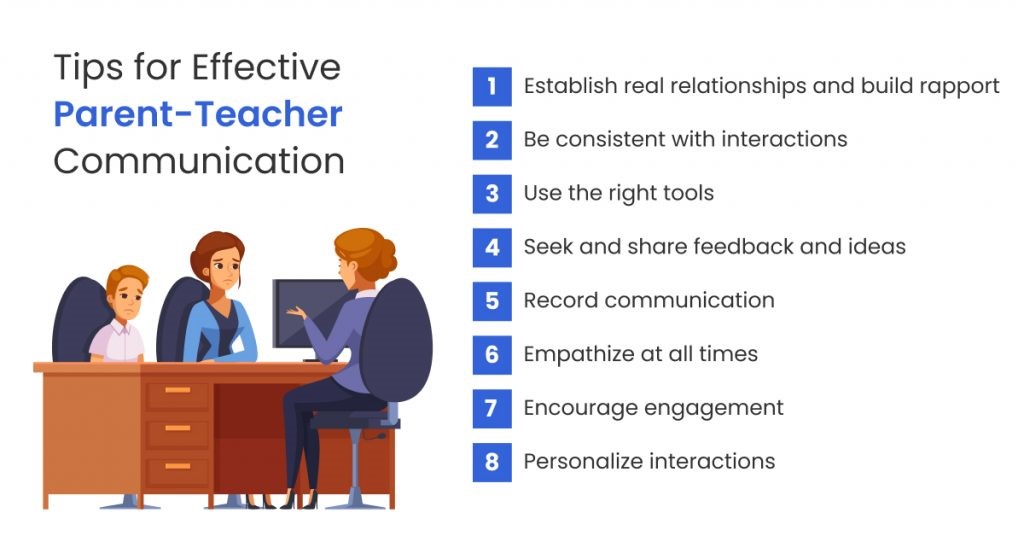How Can You Communicate With Parents Of Students With Special Education? 6 Tips!
10th October 2023

Effective communication enables individuals to build an effective connection that helps mankind thrive. In the realm of special education, staying in touch with parents now and then is important as it allows both parties to know more about the child. Positive parental engagement can have a significant impact on the students' lives, thus teachers must foster an effective working relationship with parents. Now that you know why parent-teacher communication is essential, you are probably looking for effective communication strategies to help you do it the right way. The good this is we got you covered. Read on!
How Can Teachers Engage Parents With Effective Communication

Take a look at some tips to help you know how to deal with parents to do what is best for your students:
- Initiate Communication
As special educators, you must be aware that parents of such students take time to open up and they might not always be up for a conversation even when they want to. Thus, make it a part of your job to initiate communication. Pick and time and date and consult with the parents to ask for their availability.
Converse with them, keep them updated, and offer them any information you feel is required. Give them feedback on their child's performance regularly so that they know where their child is lacking and what efforts are needed from them. If parents are kept in the dark, it can lead to frustration or shock later on. Thus make sure that you keep them posted even when the situation is worse.
- Avoid Discussing Complaints
Avoid starting a conversation with complaints. Begin the conversation on a positive note praise the child for all the extraordinary aspects and acknowledge their academic efforts. Parents love it when their child is appreciated as they never imagined such a scenario.
Hence, help the parents relax and assure them that you are taking good care of their child. Once you feel they are settled, slowly move towards the improvement areas. Let them know if their child is struggling to concentrate. Also, add that you are helping them cope with the situation to ensure productive results.
Hey, do you follow us on Social Media? We regularly share upgraded educational content, tips, feedback and more. Check us out by clicking the profiles here - Facebook / Twitter / LinkedIn / Pinterest / Instagram / YouTube
- Don’t Criticize A Child’s Behaviour
As an educator, you should refrain from criticizing the behavior of a student. Not only does this embarrass the child but also makes the parents feel self-conscious and uncomfortable. To avoid such situations, you can make the parents aware in a polite way. Remember, it shouldn’t sound like a complaint.
Guide the parents about which behavior is acceptable in a classroom and which isn't. Advise them so that they can encourage their children to act appropriately. Additionally, communicate all your efforts about how you are trying to build the character and personality of their child.
- Offer Essential Information
Never try to hide any crucial information from the parents. If you feel your students need a little guidance about their disabilities, let them know. Not only is this humane but it's also essential for the growth of the children.
Give them access to various websites from where they can get more information and deal with their child. You can also offer a parent handbook or journal that you maintain to track students' progress.
- Never Ask About Medication Directly
Medication is a sensitive topic for students and hence you should avoid talking about it directly. Even if you think it's essential, try not to be upfront as it can also make them confused and worried. In case you think medication is required, request a medical specialist to talk to the parents.
They would first examine the child and then prescribe any medications as needed. Once the proposal is made, you can let the parents know and allow them to decide if they want to accept the proposal.
- Stop Stereotyping And Labelling
Since every child is different, there is no one size fits all and everyone needs to be dealt with in their unique way. Do not make fun of the child's disability and complain about something that is a part of their natural behavior. This can hurt the feelings of both parents and children. Additionally, avoid labeling a child as disabled.
As a special educator, you are already aware of the most common disabilities and the temperament or behavior attached to them. Do not try to diagnose a child, instead seek medical attention if things go out of your control.
Reach Student’s Parents The Right Way
Your job as an educator demands more dedication and responsibility. Regardless of what you face in the classroom, you need to be patient while talking to parents. As a professional with an International Diploma in Inclusive Teaching and Special Educational Needs certificate, you are well equipped with the strategies you need to manage a gifted class. Since parents play a massive role in the development of such children, you should learn to communicate effectively. Use the above-mentioned strategies to build a good relationship and strive for the child’s growth together.
We believe education should be accessible for everyone. That’s why we don’t charge for our blogs. Find the right course that will help you in your career with us, contact us at - +6621055721. You can mail us at act@asiancollegeofteachers.com

